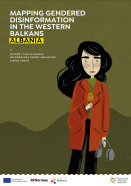MAPPING GENDERED DISINFORMATION IN THE WESTERN BALKANS – ALBANIA
July 12, 2025
In a society where women are killed with alarming frequency and where the media persistently reports such tragic incidents as “crimes of passion” rather than femicide, speaking of rape as a “moment” in which women supposedly surrender themselves to sexual pleasure is, in itself, nearly a crime. In 2023, lawyer Spartak Ngjela publicly described rape as an absence of consent and consent as a matter of morality, going so far as to state: “If she has not given her consent, at a certain point she may feel pleasure, but later she goes and files a complaint.”
This statement circulated widely across all Albanian media platforms, disseminated with the scandalous content of a lawyer who is broadly recognised by the public without raising critical questions about the weight of such a declaration, its implications for victims, or the potential harm it may inflict on future generations. Worse still, it contributed to the relativisation of rape as a crime, presenting it not as an act of violence, but as an “involuntary act that may include pleasure,” thereby neutralising its gravity.
This is merely one example among many similar media narratives that have circulated in Albanian public discourse over the past five years. While they may initially appear as conventional news items, these reports often evolve into disinformation campaigns, perpetuating gender stereotypes, normalising hate speech, and reinforcing discriminatory rhetoric. Such narratives not only undermine the principles of gender equality but also serve to consolidate deeply entrenched patriarchal structures. They reproduce and legitimise historical representations of women as inherently different and, by implication, inferior to men across social, cultural, political, and intellectual domains.

Download MAPPING GENDERED DISINFORMATION IN THE WESTERN BALKANS - ALBANIA
